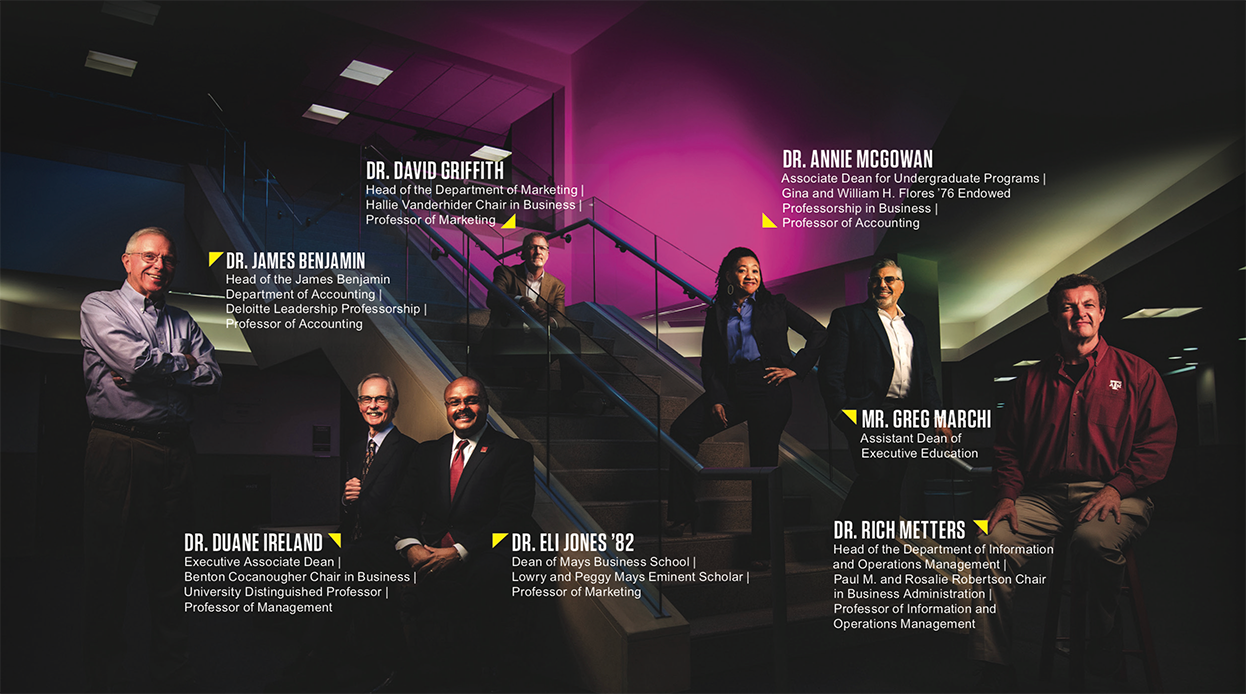First Generation: Leadership and Legacy
September 1, 2019
|
Mays Business School

As the state’s first public institution of higher education—and today, by far the largest—Texas A&M has always had the land-grant mission (and now, sea-grant and space-grant mission) of educating a broad cross-section of the population.
This means providing a world-class education that prepares graduates for leadership roles from the very start. Former students not only have less college-related debt than their counterparts elsewhere, but they are much more satisfied with the education they received at Texas A&M.
About one-quarter of the 10,757 members of the Texas A&M freshman class of 2018-19 are the first in their families to go to college.
These first-generation students come from low-income families or families that do not have a tradition of attending college. Some were encouraged from the start to get a college degree and others were pressured to skip college and enter the workforce.
Nearly all students find it difficult to navigate the challenges of financial aid, academic advising, and career mentoring without help. With no one in their families to turn to, first-generation students often don’t know what questions to ask or where to go for answers.
But Mays Business School has changed all that.
Mays leaders understand the value these students bring today and their great promise for Texas and the world tomorrow.
In 2013, lecturer Henry Musoma ’00 and then-student Marlen Cornejo ’15 founded the Regents’ Ambassador Program, the Mays learning community for first-generation students.
Mays leaders help first-generation students, like all Mays students, become transformational leaders equipped for today’s global business context. Mays does this by ensuring a welcoming and inclusive community, by providing academic support and professional development, and by encouraging global learning and awareness.
First-generation students are a high priority for Dean Eli Jones ’82.
After all, Jones knows what it’s like to be a first-generation student at Texas A&M.
“I clearly remember sitting in a calculus class, struggling with understanding what the professor was saying and thinking, ’Now where do I go for help?’” he says.
“It was a wake-up call for me since I had no one in my immediate nor extended family to talk to for help.”
“I am very thankful for fourth- and fifth-generation Aggie families—and those who have even deeper roots here at Texas A&M. But I also have a heart for first-generation students who don’t have that kind of support.”
Jones then describes what happened just a few weeks ago, at a meeting with his executive team.
Looking around the conference table, all of a sudden, it hit him… Jones’ eyes light up at the memory.
“We talk about transformational leadership. We talk about being one of the nation’s top business schools and what we can do to climb even higher.”
“Looking around the table at my team, I realized that seven of us are first-generation college graduates ourselves. Talk about transformative!”
James Benjamin (pictured on the cover) says, “I had a good experience during my undergraduate program at the University of Maryland, but I wish that I would have been at a school like Texas A&M. The culture at A&M is unique and helps students develop lifelong skills.”
David Griffith says, “My mom talked a lot about the importance of college and saving for college. She did her best to squirrel away what she could in the hopes of helping pay for college. I started saving from my paper route money when I was nine.”
Duane Ireland says, “During my Ph.D. program, my grandmother asked me if I ever intended to do something other than be a student. First-generation students may feel a bit alone in their family because others have not had a university-level experience.”
Greg Marchi says, “My parents didn’t know about the different colleges and universities, or about the application process or choosing a major. The focus was simply on attending and graduating. If I had known more, my undergraduate decisions would likely have been different.”
Annie McGowan says, “I grew up working in my dad’s store, and I hated it. I felt like I didn’t have a childhood. But I learned how to keep track of inventory and keep a ledger, and by the time I was 12, I went over our financial reports with our CPA every month. That led me to become an accountant and an accounting professor.”
Richard Metters says, “I grew up in a lower-middle-class environment in the Philadelphia area where physicality and macho masculinity ruled. You had to fight to be socially accepted. I didn’t want to fight, so I was the oddball. It took me a year at Stanford before I realized that no one was going to beat me up.”
These stories are powerful reminders of the transformational impact that a college education can have, especially for first-generation students. Texas A&M and Mays hold a heightened focus on first-generation students to enable bright, young people to earn a college education through scholarship funding and student success programs. First-generation college graduation is a Texas A&M tradition worthy to be pursued.
Life is full of firsts – first steps, first loves, first jobs. With every “first” comes a change of your future. For first-generation college students, being the first person to attend an institution of higher education redefines not only their future, but their community’s future, too.



